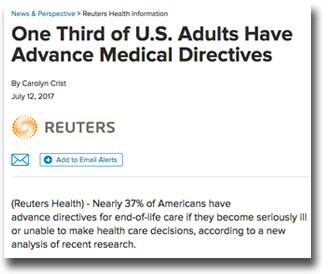Are your kidneys available to me? - Second in a series
 Researchers tell us that a little over a third of Americans have an Advance Directive. Among those with a chronic illness, only about 38% do.
Researchers tell us that a little over a third of Americans have an Advance Directive. Among those with a chronic illness, only about 38% do.
This may indicate that people don’t like to think about end-of-life matters, or that we really are not sure what to state about some issues, or both.
Perhaps if we had firm convictions about organ donation, we would state them. Can the Church help us out?
On the Donor Alliance website, we find a listing of Christian denominations and other religions in alpha order with their position statements on organ donation and transplantation. At the top of the list is the Amish statement:
The Amish will consent to transplantation if they believe it is for the well-being of the transplant recipient. John Hostetler, world renowned authority on Amish religion and professor of anthropology at Temple University in Philadelphia, says in his book, Amish Society, “The Amish believe that since God created the human body, it is God who heals. However, nothing in the Amish understanding of the Bible forbids them from using modern medical services, including surgery, hospitalization, dental work, anesthesia, blood transfusions or immunization.”
There is no mention of how the donation may alter the health of the donor.
Another denomination, the Church of the Nazarene, succinctly states:
The Church of the Nazarene encourages its members who do not object personally to support donor/recipient anatomical organs through living wills and trusts. Further, they appeal for a morally and ethically fair distribution of organs to those qualified to receive them.
This statement does not speak to the live donor of a kidney. A member of that denomination would still need to find out if it is OK with God for a living person to donate a kidney.
Mennonites position:
Mennonites have no formal position on donation but are not opposed to it. Some Mennonites may prefer natural death and may have reservations about medical intervention or prolonging life through organ transplantation. Therefore, it is important to discuss one’s wishes with family members and spiritual advisors and to ensure that they understand and respect one’s decision to become an organ donor.
Elsewhere they have encouraged members have an advance directive that will require the signee to make known if he or she wishes to be an organ donor. So, again, where is the guidance? Perhaps it is understood among the members, but I’m guessing it is unclear to them.
The Southern Baptist Convention has a fairly comprehensive affirmation about organ donation, and their website includes a Resolution on Human Organ Donations, formulated in 1988.
WHEREAS, Organ procurement for transplantation falls far short of demand; and
WHEREAS, Organ transplant technology has transformed many lives from certain death to vibrant productivity; and
WHEREAS, A Gallup poll reported in the New York Times May 3, 1987, that 82% of respondents would donate adult relatives' organs in appropriate situations, but only 20% had completed a donor card; and
WHEREAS, Complete resurrection of the body does not depend on bodily wholeness at death; and
WHEREAS, The values of a godless society promote self-sufficiency to such a degree that people are indifferent to the needs of others, as seen in resistance to organ donations; and
WHEREAS, Organ donation for research or transplantation is a matter of personal conscience.
Therefore be it RESOLVED, That we, the messengers of the Southern Baptist Convention meeting in San Antonio, Texas, June 14-16, 1988, encourage physicians to request organ donation in appropriate circumstances…
This type of statement troubles me. Here, a mostly conservative Christian denomination approves of organ donation even while recognizing it may be objectionable to an individual’s conscience.
Which is it? OK or not? OK for you if you think it is? That is not helpful. You have told the person who can’t figure it out, that it is fine as long as it feels right. What if we used that same approach with the abortion issue? Imagine the outcry!
The problem is, these new biomedical practices are not familiar to us. They have been legalized and government funded so we accept them as safe and advisable. There are movements and organizations urging us to adopt them as our way of life. Our churches debate and promote them, generally. Yet, there is a gray area.
As noted already, the focus of this blog series is only on kidney donation, not organ transplantation whether from living or dead donors. These are separate categories though they have much in common. Probably, church position statements need to address both scenarios.
If you want to do further research on the positions that religions and religious denominations hold on organ donation, here are some links. I have not found a Christian denomination that opposes organ donation.
If you, as a Christian, oppose organ donation, you are swimming upstream. But really, are you salt and light if you are an organ donor, and in particular, a kidney donor? If you refuse to be one, are you unloving and unreasonable? After all, you only need one kidney.
Prev | Next